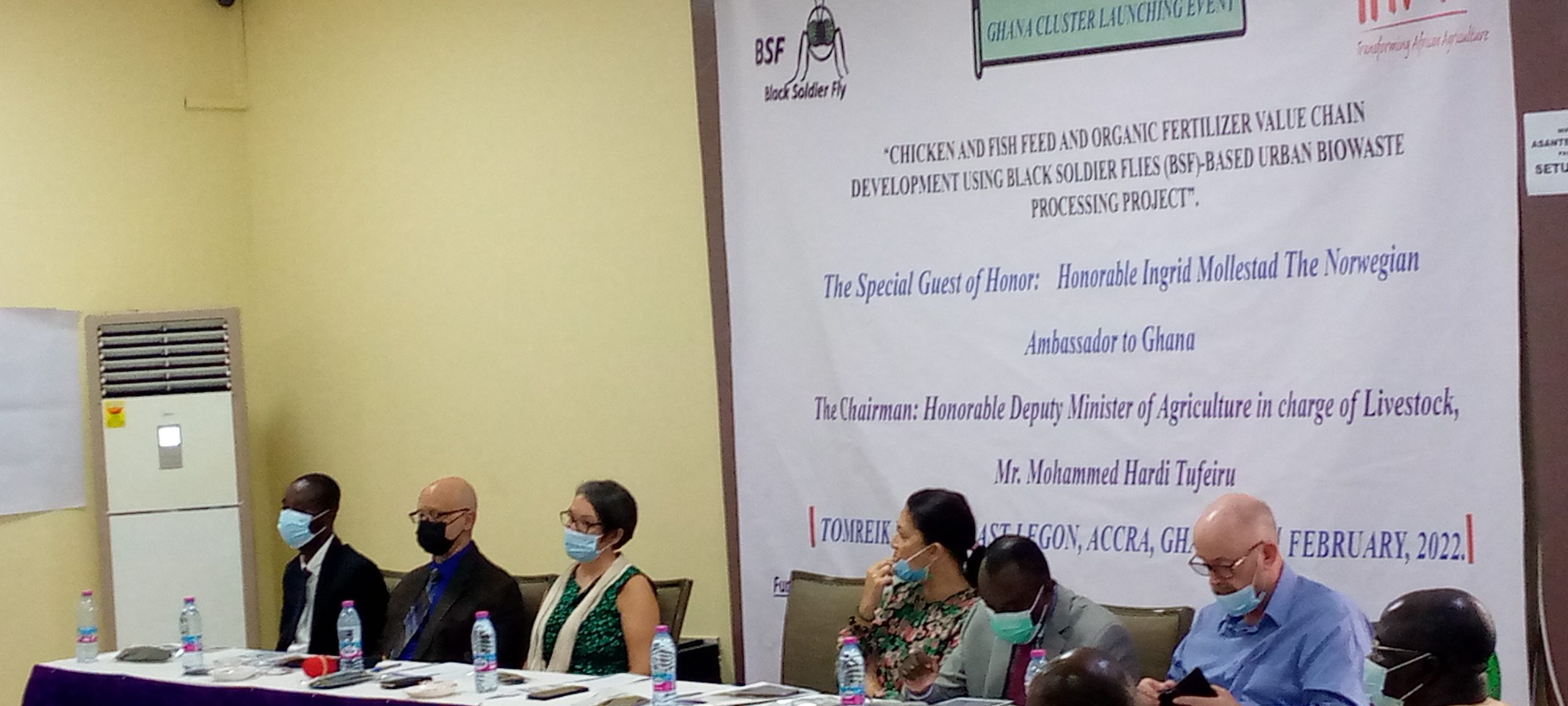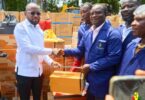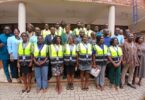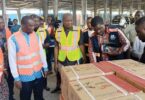Story by Ishmael Barfi
The Deputy Minister for Ministry of Food & Agriculture, Hon.Alhaji Hardi Tufeiru has applauded the Norway Embassy in Ghana, the Norwegian Agency for Development Cooperation (NORAD) and International Institute of Tropical Agriculture (IITA) for initiating the Back Soldier Fly (BSF) project aimed at improving the livelihoods of smallholder chicken, fish and vegetable producers.
According to the Deputy Minister, the project has come at the appropriate time when biowaste management and supply of animal feed and fertilizer is a headache to governments in the sub region.
Explaining that, the outlook Report of the 2018 United Nations Environmental Protection (UNEP) on the State of Waste in Africa indicates that, Municipal Solid Waste (MSW) generation in Africa is projected to double by 2025, from 125 million tone in 2012.
While an estimated 70-80%of the MSW generated in Africa is recyclable, but Interestingly, only 4% of the MSW enters the recycling process hence biowaste , which constitutes the larger share of Municipal Solid Waste, remains neglected.
The Deputy Minister made these remarks during the project launch entitled “Chicken and Fish Feed and Organic Fertilizer Value Chain Development Using Back Soldier Fly-Based Urban Biowaste Processing in Ghana, Mali and Niger” in Accra.
Hon. Alhaji Hardi Tufeiru noted that with limited resources and infrastructure in the face of growing population, Accra, Bamako, and Niamey are among the major African cities plagued by MSW management problems, particularly biowaste management.
“In Accra, for example, degradable organic materials make up about 67% of the waste stream” he said.
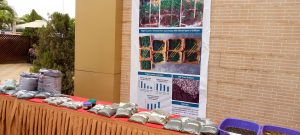
Deputy Minister for MOFA Applauds Norway Embassy & IITA for investing in Organic Fertilizer in West Africa
He revealed that, with a trajectory of economic growth, rapid population growth, and urbanization, on one hand, the challenge of MSW management, particularly the organic portion of the MSW, is likely to persist creating unsanitary environmental conditions that pose health risks and contribute to greenhouse gas emissions.
“Currently, more than 90% of waste generated in Africa is disposed of at uncontrolled dumpsites and landfills.
Adding that, food demands are increasing and consumption patterns are changing, with dietary diversification into diverse vegetables fruits, and livestock products.
Revealing that, currently, Ghana produces between 12,000 to 15,000 Mt of poultry feed annually
Attributing it to the high cost of raw materials due to the high demand of the input raw materials for both human consumption and other industrial uses.
Therefore believes that, the technology of production of high quality feed from Black Soldier Fly (BSF) and organic waste will bridge these completion gap thereby reducing the cost for producing poultry feed in Ghana.
Also was of hope that, the project will build a business case to stimulate private investment in sustainable biowaste management and sustainable production of animal feed and organic fertilizer in Accra, Bamako,Niamey.
As well as the project will utilize Black Soldier Fly (BSF) larvae to process vegetable and fruit waste from markets and slaughterhouse waste into animal feeds and organic fertilizer.
Adding that,the production of animal feed and organic fertilizer will help to improve agriculture production at a competitive cost revealing that, Ghana currently produces between 12,000 to 15,000 Mt of poultry feed annually.
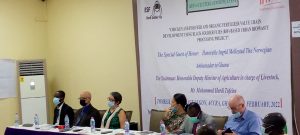
Deputy Minister for MOFA Applauds Norway Embassy & IITA for investing in Organic Fertilizer in West Africa
“The project will not only benefit poultry farmers but also provide high quality organic fertilizer for Peri-urban agriculture to reduce the cost and application of inorganic fertilizer”, he noted.
On her part, Dr. May-Guri Saethre, Senior Advisor at the Department for Climate and Environment Section for Food, NORAD-Norway noted that, chicken and fish farming are among the most rapidly expanding private sectors in African agriculture that, the industry is currently based on the traditional animal feed sources namely soybean, wild fish and maize meal.
She further explained that, “the rapid growth of this private sector also globally demands increased efforts to find alternative feed sources, competitive in price and quality, without occupying additional agricultural land”.
To that effect, the initiation of the Black Soldier Fly project will turn vegetables/fruit and slaugtherhouse waste into chicken and fish feeds and organic fertilizer using the Black Soldier Fly (BSF) larvae.
“ The project promises to generates to generate multiple benefits: economic benefits, clean environment, job creation, empowerment of youths and women”, she noted.
According to her, NORAD sees this project as realistic and cost effective, but also challenging because it includes three countries and BSF production and processing facilities needs to be established in year one of the project.
“To be able to start delivering impacts within three years means that, the project is delivering on the business models, the capacity building and not least on policies and regulations for use of insect results across the three countries within that period”, she added.
The project she stated had a strong national support from the national systems in each target country, namely CSIR-IIR in Ghana, IER in Mali and I RAN in Niger.
And have the confident that, the need for alternative protein sources for animal feed will be incentive for active participation as well as ensure success at the national levels.
Project Background:
The project entitled “Chicken and Fish Feed and Organic Fertilizer Value Chain Development Using Back Soldier Fly-Based Urban Biowaste Processing in Ghana, Mali, and Niger is a three year project funded by the NORAD since October 2021.
The specific objectives of the project are as follows: Understanding the current and future Biowaste streams to inform the design of a business model for sustainable biowaste management, animal feed, and organic fertilizer production.
Also to establish chicken and fish feed and organic fertilizer value chasins as well as optimize the potential of BSF Biowaste Processing and building capacities and BSF technology knowhow of youth agripreneurs and other stake holders.
The project is estimated to cost 7.5 million dollars over the period of the three year in this three countries.
Source: www.thenewindependentonline.com


